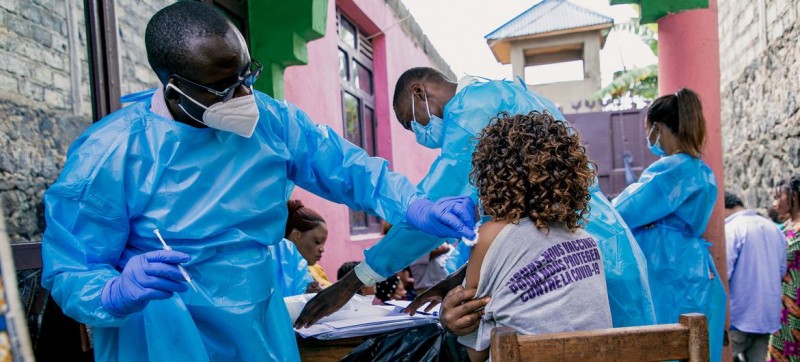A woman is vaccinated against COVID-19 in Goma, Democratic Republic of the Congo. The COVID-19 pandemic could be defeated this year but only if vaccines, tests and treatments are made available to all people, UN Secretary-General António Guterres said on Wednesday. The UN chief was among world leaders calling for $23 billion to support the ACT-Accelerator, the landmark collaboration that makes these goods accessible to everyone globally.
"The biggest barrier we face to ending the #COVID19 pandemic as a global health emergency is ensuring all people, in every country, have access to those tools.
The @ACTAccelerator is vital for this mission"-@DrTedros #ACTogether https://t.co/cMu1G3IAx3
— World Health Organization (WHO) (@WHO) February 9, 2022
People paying the price
“Vaccine inequity is the biggest moral failure of our times – and people are paying the price,” said Mr. Guterres, underlining the urgency to act now.
“Until and unless we can ensure access to these tools, the pandemic will not go away, and the sense of insecurity of people will only deepen.”
The ACT-Accelerator was established in April 2020, just weeks after the pandemic was declared, to speed up development and access to COVID-19 tests, treatments and vaccines. The global vaccine solidarity initiative COVAX is one of its four pillars.
The partnership brings together governments, scientists, philanthropists, businesses, civil society and global health organizations such as GAVI, the vaccine alliance; the Coalition for Epidemic Preparedness Innovations (CEPI), and the UN’s health agency, WHO.
‘Fair share’ financing
The campaign launched on Wednesday aims to meet a $16 billion financing gap, and nearly $7 billion for in-country delivery costs, in the bid to end the pandemic as a global emergency this year.
The co-chairs of the ACT-Accelerator Facilitation Council, which provides high-level political leadership to advocate for resource mobilization, recently wrote to more than 50 rich countries to encourage “fair share” contributions.
The financing framework is calculated on the size of their national economies and what they would gain from a faster global economic and trade recovery.
As the Secretary-General put it: “If we want to ensure vaccinations for everyone to end this pandemic, we must first inject fairness into the system.”
Procuring lifesaving tools
The funding will help to curb coronavirus transmission, break the cycle of variants, relieve overburdened health workers and systems, and save lives, world leaders said, warning that with every month of delay, the global economy stands to lose almost four times the investment the ACT-Accelerator needs.
Financing will be used to procure and provide lifesaving tools, and personal protective equipment (PPE) for health workers, to low and middle-income countries.
It will support measures that include driving vaccine rollouts, creating a Pandemic Vaccine Pool of 600 million doses, purchasing 700 million tests, procuring treatments for 120 million patients, and 100 per cent of the oxygen needs of low-income countries.
“The longer inequitable access to COVID-19 vaccines, tests and treatments persists, the longer the pandemic will persist,” said President Cyril Ramaphosa of South Africa, who co-chairs the Facilitation Council together with Norwegian Prime Minister Jonas Gahr Støre.

Bangladesh receives its first shipment of COVID-19 vaccines from the COVAX Facility on 31 May 2021.
The UN and partners continue to warn against the dangers of inequity three years into the pandemic.
Science no match for inequity
Although more than 4.7 billion COVID-19 tests have been administered globally so far, WHO report only around 22 million, a paltry 0.4 per cent, were administered in low-income countries.
Furthermore, only 10 per cent of people in these nations have received at least one vaccine dose.
“Science has consistently delivered throughout the course of the COVID-19 pandemic, but tragically the world’s scientific achievements have not yet been matched by equity,” said Dr. Richard Hatchett, the CEPI Chief Executive Officer.
“A fully funded ACT-Accelerator will enable COVAX and the other ACT-A pillars to redouble their efforts to get vaccines, diagnostics, therapeutics and other countermeasures to those who need them, while also continuing vital R&D (research and development) which will address current gaps in scientific knowledge and strengthen the world’s defences against the virus and its variants.”
Since its inception, the ACT-Accelerator has funded vital research and development of new therapeutics, vaccines, and diagnostics, and delivered over a billion vaccine doses through COVAX, among other achievements.
The mechanism has an overall budget of $23.4 billion and donors are urged to contribute $16.8 billion. They have already pledged $814 million, leaving the $16 billion funding gap. It is expected that the remaining $6.5 billion will be self-financed by middle-income countries.
Separate to the budget, another $ 6.8 billion is required for in-country delivery of vaccines and diagnostics.
Sharing and solidarity
WHO chief Tedros Adhanom Ghebreyesus stated that the rapid spread of the Omicron variant has underlined the urgent need to ensure ensure tests, treatments and vaccines are distributed equitably globally.
“If higher-income countries pay their fair share of the ACT-Accelerator costs, the partnership can support low and middle-income countries to overcome low COVID-19 vaccination levels, weak testing, and medicine shortages,” he said.
“Science gave us the tools to fight COVID-19; if they are shared globally in solidarity, we can end COVID-19 as a global health emergency this year.”




Comments are closed.